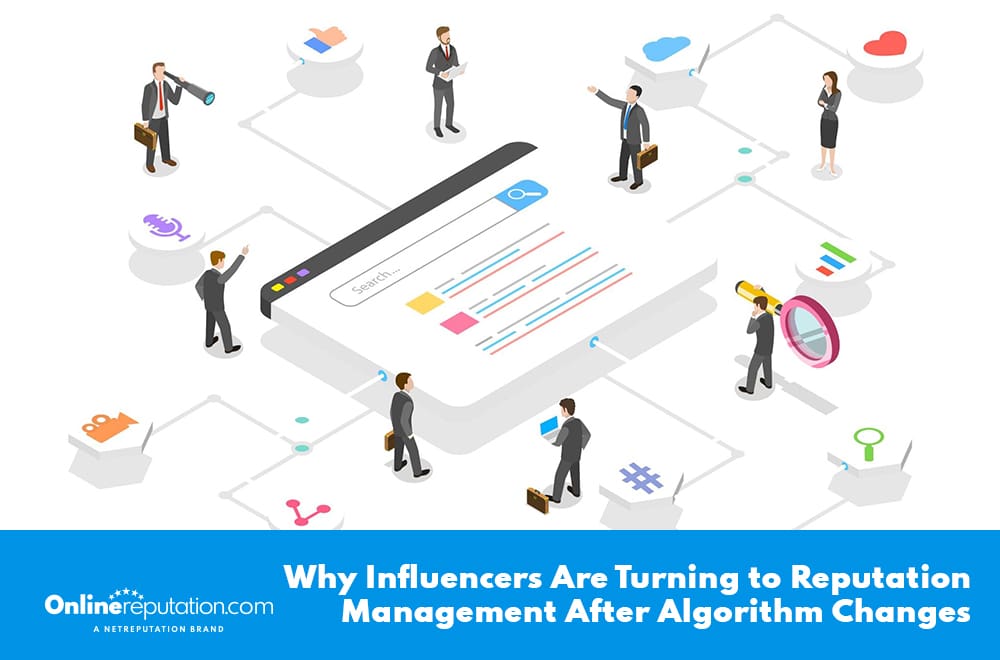
A lifestyle influencer with 250,000 followers woke up to find her Instagram reach had dropped by 70% overnight. Nothing about her content had changed—only the algorithm had. Within weeks, brand deals slowed, engagement fell, and her income took a hit.
Her story isn’t unique. Social media platforms like Instagram, Facebook, and TikTok constantly adjust their algorithms to prioritize different types of content and user interactions. For influencers, these changes can shrink visibility and weaken their online reputation almost instantly. That’s why many now turn to reputation management—not just to recover reach, but to protect their brand’s image and maintain a strong brand reputation when platform rules shift.
What Algorithm Changes Mean for Influencers and Brands
An algorithm decides which posts get seen and which disappear down the feed. Updates often favor new content formats or interaction patterns, influencing consumer sentiment and shaping public perception. These changes can affect not only an influencer’s reach but also the online reputation of businesses, brands, and individuals across industries.
Recent changes have:
- Prioritized short-form video over static images
- Shifted posting “sweet spots” for maximum reach
- Rewarded accounts with fast engagement (likes and comments within minutes)
For influencers, small businesses, and corporations, these shifts can mean fewer impressions, lower engagement, lost brand opportunities, and challenges in maintaining positive brand associations and consumer trust.
Why Reputation Management Matters After Algorithm Changes
Social media platforms and search engines play a major role in shaping public opinion and influencing purchasing decisions. Anyone with an online presence—whether an influencer, a small business owner, or a corporate leader—needs an effective reputation management strategy to protect their brand and sustain growth.
Effective reputation management includes:
- Monitoring online reviews, review sites, and third-party mentions across social media platforms and news sites
- Engaging with your audience across social media accounts to foster a positive social media presence
- Responding promptly to customer feedback, negative reviews, and potential misinformation
- Using reputation management tools or online reputation management software to track mentions and address issues early
By doing so, you can maintain trust with existing customers, attract new customers, and uphold a positive brand reputation despite constant algorithm shifts.
How Influencers Protect Their Online Reputation
Influencers who adapt fastest often focus on three critical aspects of reputation management:
1. Stay Visible Beyond the Algorithm
- Use multiple platforms to reach followers and diversify marketing efforts
- Share links through newsletters, blogs, or other channels to expand reach
- Get featured on authoritative websites and news outlets to enhance corporate reputation management
- Collaborate with peers and industry peers to build credibility and broaden audience base
Maintaining visibility beyond a single platform helps influencers and small businesses mitigate risks associated with algorithm changes. By broadening their presence, they reduce dependency on any one channel, which helps stabilize their brand visibility and ensures that potential customers can find them through various search results and social media posts.
2. Engage Directly With the Audience
- Respond promptly to comments and messages to demonstrate attentiveness
- Encourage user-generated content (UGC) to show authenticity and increase review volume
- Ask for feedback and act on it to improve customer experience and generate more positive online reviews
- Use engagement strategies to boost review requests and deepen customer relationships
Direct engagement fosters a strong connection with followers and consumers, helping to build an excellent reputation that withstands fluctuations in platform algorithms. Marketing teams recognize that authentic interactions encourage loyalty and prompt existing customers to share their experiences, creating valuable social proof that attracts new customers.
3. Monitor and Respond Quickly
- Use monitoring tools like Google Alerts for real-time tracking of brand mentions and consumer sentiment
- Address negative feedback before it spreads to minimize impact on the company’s reputation
- Correct misinformation on review platforms and third-party sites to maintain accurate public perception
- Regularly review sentiment analysis data to identify trends and adjust the reputation management strategy accordingly
A reputation manager or dedicated marketing teams can leverage these tools to gain insight into how the brand is perceived online. Early detection of negative content or fake reviews allows for swift responses, helping to protect the company’s reputation and maintain trust with both existing and potential customers.
Benefits of a Strong Reputation Management Strategy
A proactive approach can help influencers and brands:
- Keep brand deals coming – Brands value a strong reputation and loyal audience, even if engagement dips temporarily
- Rank higher in search engine results – Positive content and press releases push down negative content in search rankings
- Build long-term trust – Consistency and professionalism lead to stronger loyalty and more positive reviews
- Gain valuable insights – Monitoring customer feedback reveals audience needs and guides better marketing efforts and content decisions
By implementing a strong reputation management strategy, influencers and businesses can not only recover from algorithm changes but also enhance their overall public relations and brand visibility. This approach ensures they remain competitive and relevant in an ever-evolving digital landscape.
Risks of Ignoring Reputation Management
Without a comprehensive plan, influencers risk:
- Negative or fake reviews are damaging their business reputation and social media presence
- Fewer sponsorships as brands choose partners with better online perception and strong brand reputation
- Loss of followers and engagement, reducing revenue, and limiting growth opportunities
- Long-term damage that is costly and difficult to repair, affecting both online reputation and corporate reputation management
An algorithm change can hurt—but a damaged reputation can end a career.
Moving Forward
Algorithms will keep changing. Influencers who rely solely on platform reach are vulnerable to sudden shifts in consumer sentiment and public perception. Those who invest in an effective reputation management strategy—building relationships, controlling their narrative, and maintaining quality—are better positioned to succeed long-term.
By combining online review management, customer engagement, and reputation management software, influencers can safeguard their image, maintain brand visibility, and build a reputation that withstands the ups and downs of social media algorithms, meeting evolving consumer expectations and securing their place in a competitive market.
You might also like
How Platform Bugs Lead to Reputation Crises
A lifestyle influencer with 250,000 followers woke up to find her Instagram reach had dropped by 70% overnight. Nothing about …

